What: Forget Disneyland and Ocean Park, for many years this view was a top choice for postcards. But why would you want to send a postcard of the Albany filter beds?
They seem plain now, but listen to this description from 1893:
A visit to the sources of the water supply of the city of Victoria is one of the most inviting excursions the island affords, and is attractive not only from the great interest the works themselves call forth, but from the charming variety of the island scenery brought to view in the ramble.
A handbook to Hong Kong, 1893.
Or this from 1924:
COLONY'S FINEST WALK
Whatever other walks he selects, nobody should miss Bowen Road. [...] Built over the conduit which conveys the Tytam water from the 1 1/2 mile tunnel to the city filter beds [ie those shown above], Bowen Road is without doubt among the Colony's finest walks.
Hongkong. A brief history and guide, 1924.
And then it makes more sense that that a tourist would send these postcards after an outing to view the waterworks.
When: The back of the postcard shows it can't be later than 1937:
The owner was a man after my own heart - got as far as buying the card and sticking a stamp on, but never got round to sending it! The stamp commemorates the coronation of King George VI on 12th May 1937.
But we can go back further than that, as up at the top of the photo, all five buildings of Queen's Gardens are still standing:
And we know that the building on the left (Nos. 1 & 2, as there were two houses to each building) was demolished in 1933 [1], so it's definitely earlier than that.
In the centre of the photo, Garden Terrace is nearing completion:
Can anyone give a firm date for that?
For now I'll guess the photo was taken around 1930.
Where: We're looking at the area around the top of Garden Road. The tennis courts on the left belong to the Ladies Recreation Club:
The club is still at the same site today. And though the filter beds aren't visible any more, you can see their outline if you look at the shape of the park below Brewin Path - see the green patch in the centre of this map:
Who: We can see a few workmen in the distance, moving around the Garden Terrace construction site. There's no sign of anyone working at the filter beds,
though we can see the piles of sand that they'd have to move.
Does anyone know if it is sand that has settled out of the water and has to be removed, or sand that would be added into the ponds to act as the filter?
Regards, David
References:
- The demolition of 1 & 2 Queens Gardens is reported in item 215 of the Public Works Department Annual Report for 1933.
Reference: A088
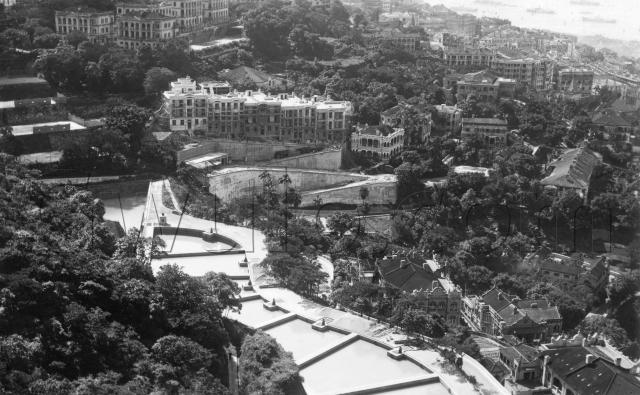
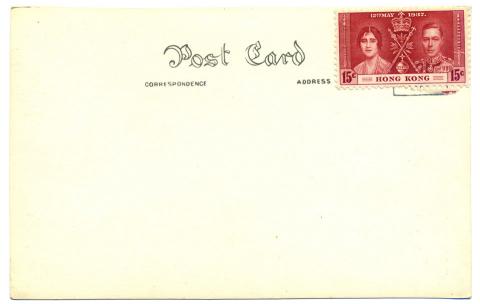
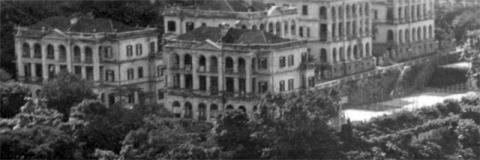
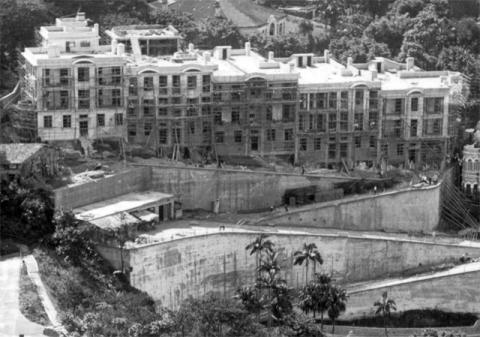
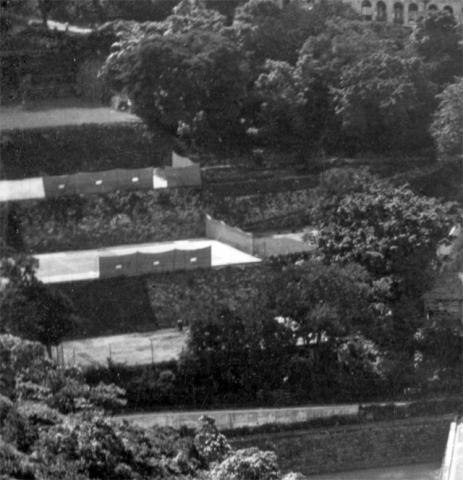

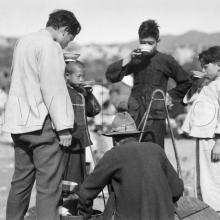
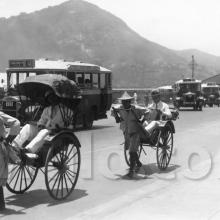
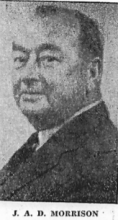
Comments
The sand is the filter medium
According to the China Mail 31/7/1947, the filter beds used a "slow sand" method of filtering, developed by James Simpson in 1829, where the sand traps the impurities.
Filter-bed sand
Thanks for that - I found a bit more based on your information, and summarised it here.
Regards, David
Filter Beds
David, if these were anything like the ones that used to be at the end of Conduit Road they were quite shallow - about 6' deep, not so deep that a big dog couldn't jump in and out - and at the base were square red clay or cement tiles roughly 18'x18" and 3" thick with perforations at 1" centres. These let the water through to a chamber below that was absolutely beautiful but never seen. It was about 12' high filled with a grid of brick arched vaults on columns in almost Gothic form which held up the filter section. Presumably this held the store of filtered water that was then released to the city as needed. In the mid '90s Waterworks smashed the lot to build the new raised filter beds that are there now.
Depth of the Filter Beds
John is probably right about the beds being 6-8 ft deep, there are plenty of pictures of the workers in empty beds doing maintenance, which show that sort of depth. Although I would have thought the filtered water would have been held in the Service Reservoir at the end of the beds.
As an aside, the water from the hillsides behind the LRC don't go into the reservoir, they are diverted underneath, and down the Albany nullah.
Of course i could be wrong ;-)
Alun
re: Filter Beds
John & Alun, thanks for the extra information. If anyone reading this has a photo of how it looked in the chambers below the filter beds, please let us know.
Are there still any filter beds in Hong Kong that follow the old style John described?
Regards, David
LRC used filter beds
When the LRC built its swimming pool c.1948, it had its own filter bed high on their property to begin with. Later they built some sort of mechanical filtering system.
Depth of the Filter Beds
Under the filter beds
Thanks to IDJ for this photo of Victorian filter beds with the covering removed:
I've read that the sand did
I've read that the sand did not act as a filter, like a sieve, but the good bugs that grew in the sand broke down the impurities in the water coming in.
There's more about those good
There's more about those good bugs at:
http://gwulo.com/node/4972#comment-19575
Regards, David